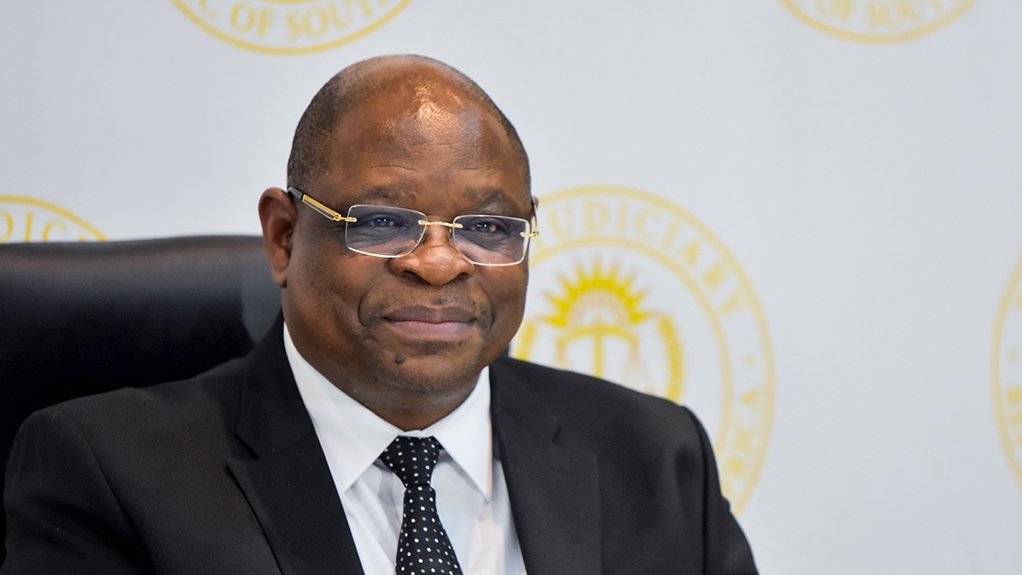Chief Justice Raymond Zondo has assured the public that the South African judiciary is made up of judges with integrity and is strong enough to withstand any pressures that may be placed on it.
Zondo said this in his acceptance speech after an honorary Doctor of Laws degree was conferred on him by Rhodes University at its second of six graduation ceremonies at Settlers Monument in Makhanda on Wednesday.
"I believe from the bottom of my heart that the judiciary of South Africa is strong enough to withstand whatever pressures may be placed on it to decide cases in accordance with the oath of office that judges take when they get appointed," Zondo said as part of a 20-minute speech.
President Cyril Ramaphosa announced Zondo as the sixth Chief Justice of the democratic South Africa on 10 March 2022.
He was heavily criticised by some while serving as the chairperson of the State Capture Inquiry for hauling prominent and powerful politicians before the commission to testify about corruption in the state.
Rhodes University vice-chancellor Professor Sizwe Mabizela described Zondo as an exemplary and selfless leader.
"His role as the chairperson of the judicial commission of inquiry into allegations of state capture will always stand as a monument to exemplary leadership, courage, dedication and selfless service to our nation. Our nation owes him an inestimable debt of gratitude and appreciation for dedicating his life to public service and the betterment of humanity," said Mabizela.
Zondo said in the last few years, the South African judiciary had staved off pressure with aplomb and decided on cases the way they should be decided
"To those who ask the question: 'Is the judiciary of South Africa sufficiently strong and independent to withstand the challenges that we can see are coming in future?' my answer is yes. It (the answer) is based on the track record of the judiciary and the fact that the judiciary of South Africa is made up of judges who have integrity," he added.
Zondo was born in Ixopo, KwaZulu-Natal, on 4 May 1960. He completed his secondary school education at St Mary's Seminary in Ixopo.
He matriculated at the age of 20 and studied toward a B Juris at the University of Zululand. He studied alongside retired Chief Justice Mogoeng Mogoeng. Zondo obtained an LLB from the University of Natal.
He also has three LLM degrees from the University of South Africa - LLM (cum laude) in labour law, LLM in commercial law and LLM with specialisation in patent law. Zondo worked at the Legal Resources Centre after obtaining his B Juris to secure funding for his LLB.
After completing his LLB, he served part of his articles of clerkship at Mxenge, Ngxingweni, and Shezi Attorneys in Durban. He then ceded his articles of clerkship to Mthembu and Partners and later finished his articles at Chennells Albertyn Attorneys.
After his admission as an attorney in 1989, he became a partner at Mathe and Zondo Incorporated. He practised as an attorney for several years.
In 1991 and 1992, he served on two committees of the Commission of Inquiry regarding the Prevention of Public Violence and Intimidation (also known as the Goldstone Commission), which investigated violence in South Africa during the early 1990s.
In 1994, Zondo was appointed as a member of the Ministerial Task Team responsible for producing a draft Labour Relations Bill for post-apartheid South Africa. With certain amendments, the bill was passed into the Labour Relations Act in 1995.
In 1996, Zondo was appointed as the first chair of the Governing Body of the Commission for Conciliation, Mediation and Arbitration, from which he resigned upon his appointment as a judge.
In November 1997, he was appointed as a Labour Court judge, and in 1999, he was appointed as a judge of the then-Transvaal Provincial Division of the High Court (now the Gauteng High Court). In May 2000, Zondo was appointed Judge President of the Labour Court and the Labour Appeal Court for a 10-year tenure.
During this time, he served on various ad hoc committees established by the heads of courts. These included a committee chaired by late Justice Pius Langa, which drew up a document to be used by the judiciary in dealing with complaints about racism and sexism within the judiciary.
Zondo also chaired a committee of the heads of court which looked into the use of official languages in courts.
In March 2011, he was honoured by the KwaZulu-Natal Legal Forum for his contribution to human rights in South Africa. With effect from 1 September 2012, he was appointed as a Constitutional Court Justice.
On 1 June 2017, Zondo was appointed Deputy Chief Justice. In January 2018, former president Jacob Zuma appointed him as the chairperson of the State Capture Inquiry. The commission investigated various allegations of state capture, corruption and fraud in the public sector from 2018 to August 2021. It submitted its report to Ramaphosa in six parts, from 31 December 2021 to 22 June 2022.
Ramaphosa accepted a number of the recommendations made by the commission.
While he was Deputy Chief Justice, Zondo was also the chairperson of the executive committee of the South African Judicial Education Institute (SAJEI). As Chief Justice, he also serves as the chairperson of the SAJEI council.
EMAIL THIS ARTICLE SAVE THIS ARTICLE
To subscribe email subscriptions@creamermedia.co.za or click here
To advertise email advertising@creamermedia.co.za or click here











